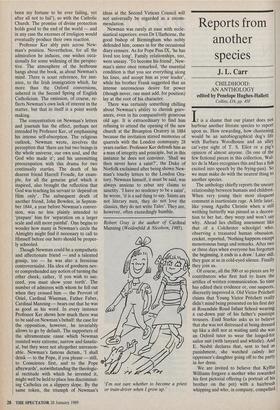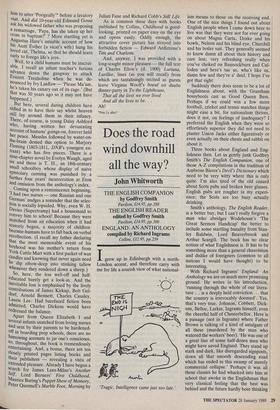Reports from another species
J. L. Carr
CHILDHOOD: AN ANTHOLOGY edited by Penelope Hughes-Hallett Collins, £16, pp. 450 It is a shame that our planet does not harbour another literate species to report upon us. How rewarding, how chastening would be an autobiographical dog's life with Barbara Woodhouse and an alley cat's-eye sight of T. S. Eliot or a pig's opinion of almost anyone. (In one of the few fictional pieces in this collection, Wal- ter de la Mare recognises this and has a fish excited into speech by the frying-pan). So we must make do with the nearest thing to another species.
The anthology chiefly reports the uneasy relationship between humans and children. When very young their most eloquent comment is inarticulate rage. A little later, like young Agatha Christie when a still writhing butterfly was pinned as a decora- tion to her hat, they weep and won't say why. Ahead lies chilling assessment like that of a Colchester schoolgirl who, observing a treasured human obsession, cricket, reported, 'Nothing happens except monotonous bangs and remarks. After two or three days when everyone has forgotten the beginning, it ends in a draw.' Later still, they gaze at us in cold-eyed silence. Finally they join us. Of course, all the 500 or so pieces are by contributors who first had to learn the artifice of written communication. So time has edited their evidence or, one suspects, discreetly improved it. Old Victor Pritchett claims that Young Victor Pritchett really didn't mind being presented on his first day at Rosendale Road Infant School wearing a cut-down pair of his father's pinstripe trousers. Enid Starkie asks us to believe that she was not distressed at being dressed up like a doll nor at waiting until she was an Oxford tutor to wear the longed-for sailor suit (with lanyard and whistle). And E. Nesbit declares that, sent to bed as punishment, she watched calmly her oppressor's daughter going off to the party in her dress.
We are invited to believe that Kyffin Williams forgave a mother who rewarded his first pictorial offering (a portrait of his brother on the pot) with a hairbrush whipping and who, in company, compelled him to utter 'Poogeally" before a lavatory visit. And did 10-year-old Edmund Gosse ask his widowed father who was proposing a remarriage, 'Papa, has she taken up her cross in baptism?' ? More startlihg yet is Augustus Hare's amiable account of how his Aunt Esther (a vicar's wife) hung his loved cat, Thelma, so that he should learn early to forego life's joys. Well, to a child humans must be inscrut- able. I recall an infant teacher's furious advance down the gangway to attack Everett Trenholme when he was de- nounced by Ivy Laidlaw — 'Please Ma'am, he's taken his canary out of its cage.' (But that was 50 years ago so it may not have happened.) But here, several daring children have sidled in to have their say whilst heaven still lay around them in their infancy. There, of course, is young Daisy Ashford Who, having written her devastating account of humans' goings-on, forever held her peace. Measles followed by water-on- the-brain denied this option to Marjory Fleming (1803-1811, DNB's youngest en- trant) who has five pieces. There is a nine-chapter novel by Evelyn Waugh, aged Six and there is T. H., an 18th-century small schoolboy whose display of naive epistolary cunning was punished by a further four years' incarceration at Eton and omission from the anthology's index. Coming upon a reminiscence beginning, I had two nurses — one Russian and one German' nudges a reminder that the selec- tion is socially lopsided. Why, even W. H. Davies (Supertramp) had a housemaid to convey him to school! Because they were snatched from an education when it had scarcely begun, a majority of children- become-humans have to fall back on verbal recollection. (I recall my father declaring that the most memorable event of his boyhood was his mother's return from York Cattle Mart with a first packet of wax candles and knowing that never again need he dip elbow-deep into stinking tallow whenever they rendered down a sheep.) So, here, the less well-off and half- educated barely get a look-in. And the inevitable loss is emphasised by the lively contributions of James Kirkup, Bob Gel- doff, Arnold Bennett, Charles Causley, Laurie Lee. Had barefaced fiction been admitted, Charles Dickens would have redressed the balance.
Apart from Queen Elizabeth I and several infants snatched from loving nurses and sent by their parents to be hardened- off in boarding prep schools, there are no harrowing accounts to jar one's conscience, so, throughout, the book is tremendously entertaining. And, a bonus, there are ten closely printed pages listing books and their publishers — revealing a vista of extended pleasure. Already I have begun a search for James Lees-Milne's Another Self, Lord Berners' First Childhood, Maurice Baring's Puppet Show of Memory, Peter Quennell's Marble Foot, Morning by Julian Fane and Richard Cobb's Still Life.
As is common these days with books published by Collins, Childhood is good- looking, printed on paper easy on the eye and opens easily. Oddly enough, the attractive cover picture has strayed into forbidden fiction — Edward Ardizzone's Tim and Charlotte.
And, anyway, I was provided with a long-sought minor pleasure — the full text of Charles Elton's (d. 1900) Luriana, Lurillee, lines (as you will recall) from which are tantalisingly recited as guests leave Virginia Woolf's boeuf en daube dinner-party in To the Lighthouse, That all the lives we ever lived And all the lives to be.. .
Ah!
*Pais j'y eller?


















































 Previous page
Previous page